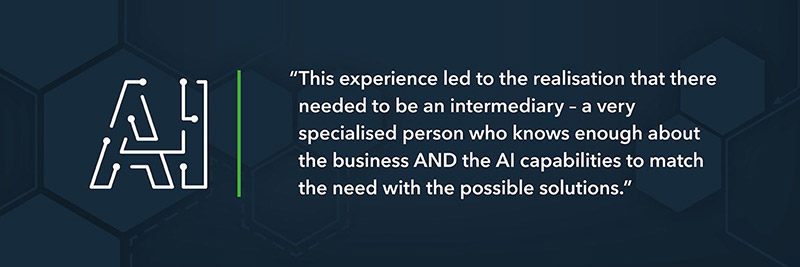
AI – The amount of information and number of opinions out there at the moment are simply overwhelming, but the one sentiment that you cannot ignore is that AI is here and you need to adopt it professionally, no matter what business you are in.
The opportunity
Cognitive technology provides opportunity in virtually every business – at its best it is another, hugely powerful brain that never sleeps and is never distracted. It can be used 24/7 to do jobs that otherwise rack up manhours, and it can also come up with solutions that otherwise might not have been identified.
The challenges
AI isn’t a ‘new’ technology, but it is one that has only recently become genuinely accessible for mainstream businesses and individuals. Because of that, it is new to a lot of people, and that means they don’t quite know what to do with it yet, or how to do it.
It’s a case of businesses knowing, or thinking, that they should be harnessing the power of AI but not knowing exactly what to do.
The uptake of AI is currently at the sharp end of digital transformation, in the significant impact that AI can have on the digitalisation of processes, services and products within an organisation. And as always, the challenge of digital transformation is not only upskilling within the organisation, in terms of the hardware and software being adopted, but is also changing mindsets within the organisation.
The biggest obstacle to integration of new technology is failure to launch, and this occurs because not enough focus is put on these initiatives. AI tech integration is often seen as a side hustle in someone’s job role, but if an organisation is genuinely committed to implementing this integration, it needs to be the focus of a person’s role or even a team’s role. So how do you solve for this focus?
The solution
There are a few levers that can be used to give AI the focus it deserves.
- The first is to create a position whose sole responsibility is making AI implementation happen. They must drive every phase of the project and not get distracted by their ‘day job’.
- Another is getting buy in from the top down – it is essential that leaders believe that there is a need for AI in the business, that they are committed to making it work, and are also committed to supplying the resources needed to successfully and comprehensively integrate it into the organisation.
- The third is by using levers such as KPIs and OKRs to motivate for AI to be given the time it deserves, to shift the focus of the team’s view onto AI and its systematic implementation in the organisation.
Even once the focus is there, there are also other elements that need to be considered to drive the successful implementation of AI in an organisation. Firstly, be realistic. Don’t immediately think that AI technology will be able to tackle the biggest tests that your company faces. Yes, there is that potential, but initial practical applications may be better suited to lower-hanging fruit – daily applications that can be streamlined or optimised through the use of an AI program.
Instead of looking at available AI products and seeing where they can be applied to your business, stick with standard business practice – start by identifying a business goal that needs to be accomplished, and then see if there is a cognitive technology that can assist. (There almost certainly is.)
This is where the next challenge appears – matching the need to the solution, and there is no one way to do this. At Ignition we have been developing our own machine-learning and AI-powered programmes for years, and so we have already gone through the learning process that many businesses are currently navigating.
We had our business team, who knew the business goals, and we had the data science team, who knew the AI-powered products and capabilities. There was an initial disconnect between the teams, though, with the business team not knowing what the software was capable of, and the data science team not knowing what the business really needed from the data and the technology. It was a case of both teams not knowing what they didn’t know, and potential being lost because of it.
Once we had realised that AI needed to be approached from the standpoint of business goals, we also realised that our data science team needed to understand these goals.
This experience led to the realisation that there needed to be an intermediary – a very specialised person who knows enough about the business AND enough about the AI capabilities to match the need with the possible solutions. Obviously when this intermediary gets a deep enough knowledge, they can also start to see the potential in technology and then potentially approach it from that side as well.
This is where we still stand today: a business team, a data science team, and an intermediary or interface team that knows enough about the goals and the software to get the best out of both teams and realise the potential of AI. It has worked extremely well, and though it may seem an obvious solution when you look at it, it’s one that most businesses have yet to adopt.
The future
I see the future playing out in two ways. If a business chooses to keep things internal, they will create an intermediary role, be it an individual or a team. If a business decides not to go internally, they will adopt a specialist platform that contains AI functionalities. By using these platforms they will be able to integrate AI efficiencies into their operations.
Smaller business in particular will benefit from this sort of software, where they don’t have the expertise or the ability to make the improvements to their business that they know they need to make. They don’t have a team of data scientists or data engineers to do the work for them. At some stage there will be a software ecosystem that caters for these businesses by giving them the benefits of AI and data science without the need to understand it.
But as for the future, it’s hard to imagine something that AI won’t be able to do. As Sam Altman, CEO of OpenAI, creators of ChatGPT, recently said, “In 10 years, I think we will have chatbots that work as an expert in any domain you’d like. So you will be able to ask an expert doctor, an expert teacher, an expert lawyer whatever you need and have those systems go accomplish things for you.”
That is a great thing, but it does mean that we will need to continually adapt, as individuals and businesses. Adapt to use the technology and it could make life more productive and rewarding. Fail to adapt and you could find yourself left behind at an ever-accelerating pace. Another quote that I recently read summarises my own feelings on the subject, and also exemplifies the solution as I see it, is this: “You won’t be replaced by an AI, but you might be replaced by someone who knows how to use AI.”
Richard Swart is the Chief Operating Officer of the Platforms business at Ignition Group.


